I'd like to recommend five great reads. If you are interested in culture, cognition and history like me you will love these books. Entries here are ranked (1 being highest) according to the impression I feel they made upon me. I provide links to each book on Amazon, as well as summary and comment.

Image: Johannes Jansson (via Wikipedia creative commons)
The five best books I've read this year — culture, language, history and psychology
**Please comment to recommend similar books!**
5. The origins of monsters: Image and cognition in the first age of mechanical reproduction (2014) by David Wengrow
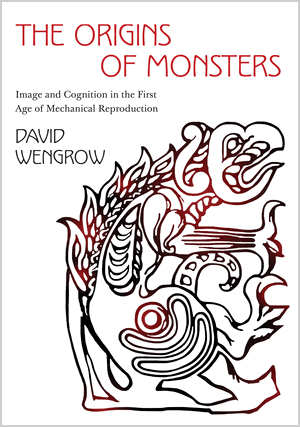
Although composite creatures (think chimeras and minotaurs; anything that combines the body parts of multiple animals into a single, fictional being) are among the earliest figurative images found in the archaeological record, they appear there only scarcely up until the Bronze-Age. During that period, mechanized forms of goods-production began appearing with the emergence of urbanized life.
Wengrow suggests that just as production-machines made of discrete ‘parts’ became institutionalized into the knowledge of Bronze-Age craftsmen (potters, smelters, brewers) during the bronze age, so too did living beings start being viewed as the conglomeration of composite 'parts' in the collective mind. This was a change in how people thought about the bodies of beings: just as machines are componential, so too became the bodies of living beings. This is why we see these images emerge throughout the Old World only after this cognitive shift.
I am student of Cognition and Culture, meaning I am interested in how mind and culture influence each other. This book thoroughly upholds standard theories on mind-culture interactions (namely the minimal counterintuitiveness hypothesis offered by Pascal Boyer) while highlighting the role of technology in exactly what images might feasibly enter the cultural mind. It represents a step forward in the field, and I'm enamored with its ideas, its prose, and its beautiful illustrations.
(link)
4. How the mind works (1997) by Steven Pinker
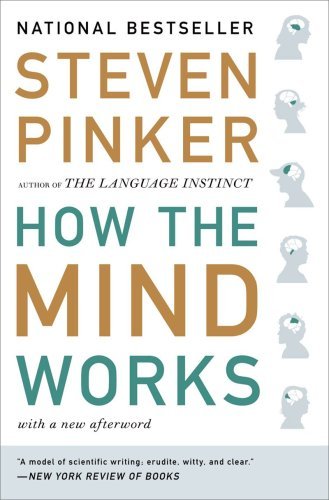
This modern classic in popular Psychology offers an introduction to cognitive science by a world class expert in the field. I suggest it is a better introduction to human cognition than undergraduate coursework for two reasons. One, while college courses move at the mercy of you and the teacher’s schedules, this comprehensive tome covers all the basic stuff in complex detail and can be taken at the reader’s pace. Two, Steven Pinker is a masterful writer, so even the really complex stuff can be enjoyably digested by anyone ready to devote the hours. My undergraduate degree is in Psychology, and while my own introductory course text in cognition was excellent, it pales in comparison to the readability and accessibility of Pinker.
Another thing that separates Pinker's book from standard cognition textbooks is a focus on everyday life. Most topics are discussed under the pretense of explaining big, and often mysterious topics, such as religion, family values, altruism and greed.
(link)
3. The horse, the wheel, and language: how Bronze-Age riders from the Eurasian steppes shaped the modern world (2007) by David Anthony
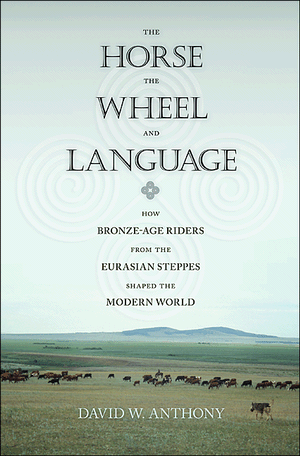
David Anthony’s widely cited work on origin and spread of Indo-European languages across the old world is an amazing achievement. This densely packed work uses evidence from historical/comparative linguistics and archaeology to track the cultural spread of the theoretical ancestor of a majority of the languages spoken today (called Proto-Indo-European). From German to Tamil, from Russian to Icelandic, linguists have long tracked similarities in these languages and proposed a singular, common root. Anthony synthesizes mountains of evidence to identify the origin (and cultural traits of the speakers of) of the Proto-Indo-European language, connecting its spread across Eurasia with the domestication of the horse and the development of horse riding, along with the use of the wheel (chariots, carts, wagons).
To give an idea of how robust a study this book presents, information in one of my posts here on Steemit on the linguistic origins of the word ‘wool’ is mostly pulled from this book. Even the subject of textiles and the domestication of the sheep among the Proto-Indo-Europeans is given in-depth treatment here. Anthony’s is hands down the most compelling and well supported model presented to date for the origin, geographically and culturally, of the Indo-European language family.
(link)
2. One simple idea: how positive thinking reshaped modern life (2014) by Mitch Horowitz
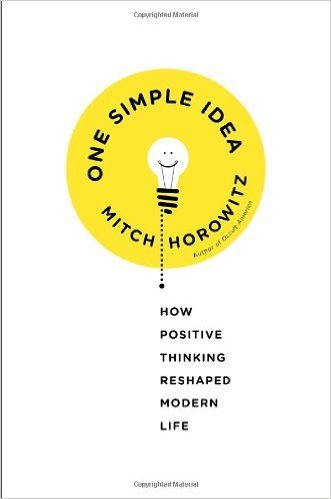
To the best of my knowledge, this is the first ever book on the history of the positive thinking movement. I’m currently working on a more in depth summary that will take up an entire post.
Mitch Horowitz is the editor of Penguin books’ metaphysical division, and an admitted proponent and practitioner of positive thinking, but this does not create an obvious bias in my opinion: this is a history book, one that tracks the emergence of the positive thinking from its roots in ancient mysticism, Theosophy, Swedenborgian Christianity, Christian Science, and New Thought, all the way up into the dogmatic positive-attitude belief system of the modern corporate world, and within pop culture as the Law of Attraction. Horowitz explores the lives of key figures in the field, most notably President Ronald Reagan and his starry-eyed rise within hollywood on the wings of popular mysticism and the positive thinking movement.
I think this is one of the most important books ever written. Today it simply goes without saying in the West that positive thinking is a (if not the) key to financial/social success. Here we find a materialist’s map of the development of the concept, which better enables us to make reasoned judgments about the soundness of the idea and its applications.
(link)
1. The better angels of our nature: Why violence has declined (2011) by Steven Pinker
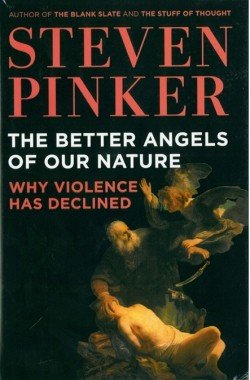
The second title by Pinker on this list is also the most controversial: Pinker provides evidence from scores of studies on rates of various forms of violence, from murder to rape; child abuse, terrorism and animal cruelty. Pinker suggests not only that all these forms of violence are declining in most of the world, but that free market capitalism, democracy, and enlightenment values are largely driving this decline (oooh, what do you think of that, Steemit?).
Pinker explores this trend not only in historical terms, but in psychological ones, distinguishing between the ‘inner demons’ and ‘better angles’ of humans’ psychological nature and how different social forces influence and are influenced by them. The sheer amount of facts, figures, and statistics presented in this nearly 700 page book is as stunning,as the fact that they all seem to be receding.
This is controversial, for sure, especially with the surging rates of terrorism this year — but that makes it all the more interesting to debate, right? At the very least, this book might make you consider reducing your pessimism about the future of humankind.
(link)
If you read this whole post, THANK YOU. Please let me know what you think, your recommendations for other books, and your opinions on the quality of the reviews.
#life #books #culture #psychology #history
edit: spelling
